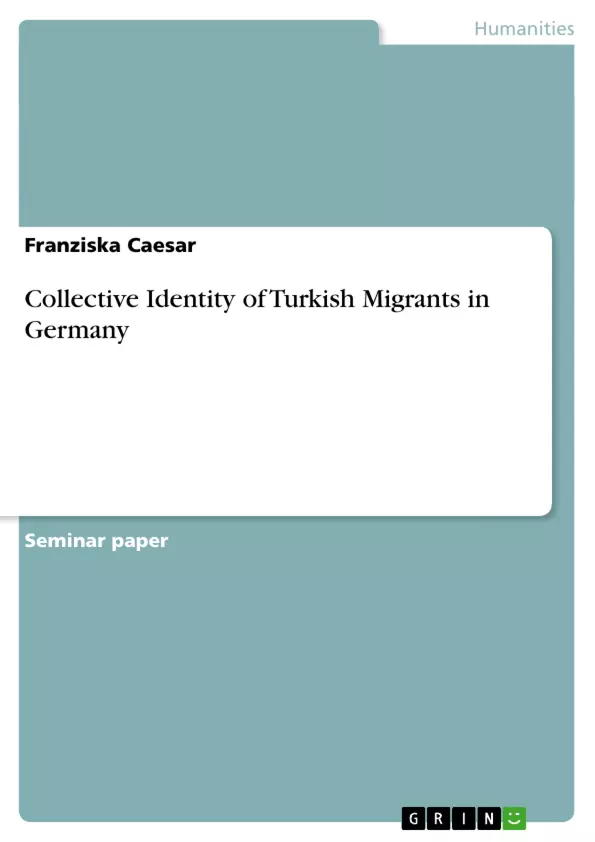Content
Introduction ………………………………………………………………………….….….. 3
1. Germany and its Turkish Migrants ..................................................................................4
2. Meaning of Collective Identity.............................................................................................7
3. Features of Collective Identity of Turkish Migrants .....................................................10
Conclusion ..............................................................................................................................13
Bibliography …………………………………………………………………………..…….15
Introduction
Over 50 years ago, the first so-called 'guest-workers' from Turkey arrived in Germany. Back then, it was neither expected that so many of them would stay and bring their families with them, nor what consequences the unprecedented influx of Turkish migrants would have. Meanwhile, Germany emerged from a guest-worker country in the 60s via a reluctant country of immigration in the 80s and 90s through to a country officially dedicated to immigration in the last decade. It was not until 2004, that Germany acknowledged its de-facto status as country of immigration and that political engagement to integrate migrants was emphasized. The importance of successful integration becomes self-evident when regarding the failures in the past, as highly considered former chancellor Helmut Schmidt criticized: "For a long time, Germans have not grasped the problem of integration. [...]. We haven't done a good job."
Integration is on daily debate now. Fierce violence at the Rütli School in Berlin-Neukölln, which marks the biggest Turkish district outside Turkey, discrimination and disadvantages in daily life testify the huge gap between requests towards immigrants to integrate and at the same time the conditions for them to do so. It further shows that the children of former guest-workers, their children's children have long become a part of our society and must be regarded as such. However, they still feel alien in their own country, it might not be as a foreigners but as strangers. These problems of identity count in particular for Turkish migrants in Germany or people with Turkish migratory background.
With almost 3 million people in 2011 , they form the biggest migrant group in Germany and are supposed to show the most obvious differences in contrast to a German 'Leitkultur'...
Inhaltsverzeichnis (Table of Contents)
- Introduction
- Germany and its Turkish Migrants
- Meaning of Collective Identity
- Features of Collective Identity of Turkish Migrants
- Conclusion
Zielsetzung und Themenschwerpunkte (Objectives and Key Themes)
This essay examines the collective identity of Turkish migrants in Germany, exploring how it has evolved over time within the context of German migration policies and societal attitudes. The essay aims to understand the factors that contribute to the formation and transformation of their collective identity, as well as how integration processes and societal interactions have influenced their sense of belonging.
- The historical context of Turkish migration to Germany, including the "guest worker" system and its impact.
- The evolving definition and understanding of collective identity, with particular attention to its dynamic and multifaceted nature.
- Key features and characteristics of the collective identity of Turkish migrants in Germany, considering factors such as language, religion, cultural practices, and experiences of discrimination.
- The potential transformation of collective identity within a context of integration, including the interplay of preserving cultural heritage and adapting to a new society.
- The challenges and opportunities for integration faced by Turkish migrants in Germany, including the role of education, employment, and social participation.
Zusammenfassung der Kapitel (Chapter Summaries)
The introduction provides an overview of the historical context of Turkish migration to Germany and the evolving status of Germany as a country of immigration. It highlights the challenges and complexities of integration and the need for a nuanced understanding of collective identity.
The chapter "Germany and its Turkish Migrants" traces the evolution of German migration policies from the "guest worker" system to the present day, emphasizing the shift in attitudes towards immigration and the impact of these policies on Turkish migrants. It also examines the changing role of religion in Turkish migrant identity and the societal response to cultural differences.
Schlüsselwörter (Keywords)
This essay focuses on key concepts such as collective identity, integration, migration, cultural diversity, and societal transformation. It explores the relationship between individual and collective identity, the challenges of intercultural communication, and the impact of migration on social cohesion and national identity.
Frequently Asked Questions
What is the focus of the essay on Turkish migrants in Germany?
The essay explores the collective identity of Turkish migrants and how it has evolved from the "guest-worker" era to Germany's current status as an immigration country.
When did Germany officially acknowledge its status as a country of immigration?
Germany officially acknowledged its de-facto status as a country of immigration in 2004.
What are key features of the collective identity of Turkish migrants?
Key features include language, religion, cultural practices, and shared experiences of discrimination or feeling like "strangers" in their own country.
What challenges to integration are discussed?
The essay discusses challenges like discrimination in daily life, the gap between integration requests and conditions, and the struggle for a sense of belonging among third-generation migrants.
What is the "Leitkultur" mentioned in the text?
It refers to the dominant German culture that is often contrasted with the cultural practices of the country's largest migrant group.
- Citation du texte
- B.A. European Studies Franziska Caesar (Auteur), 2013, Collective Identity of Turkish Migrants in Germany, Munich, GRIN Verlag, https://www.grin.com/document/212328



